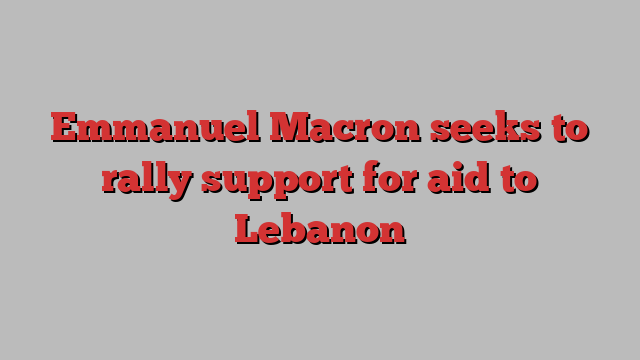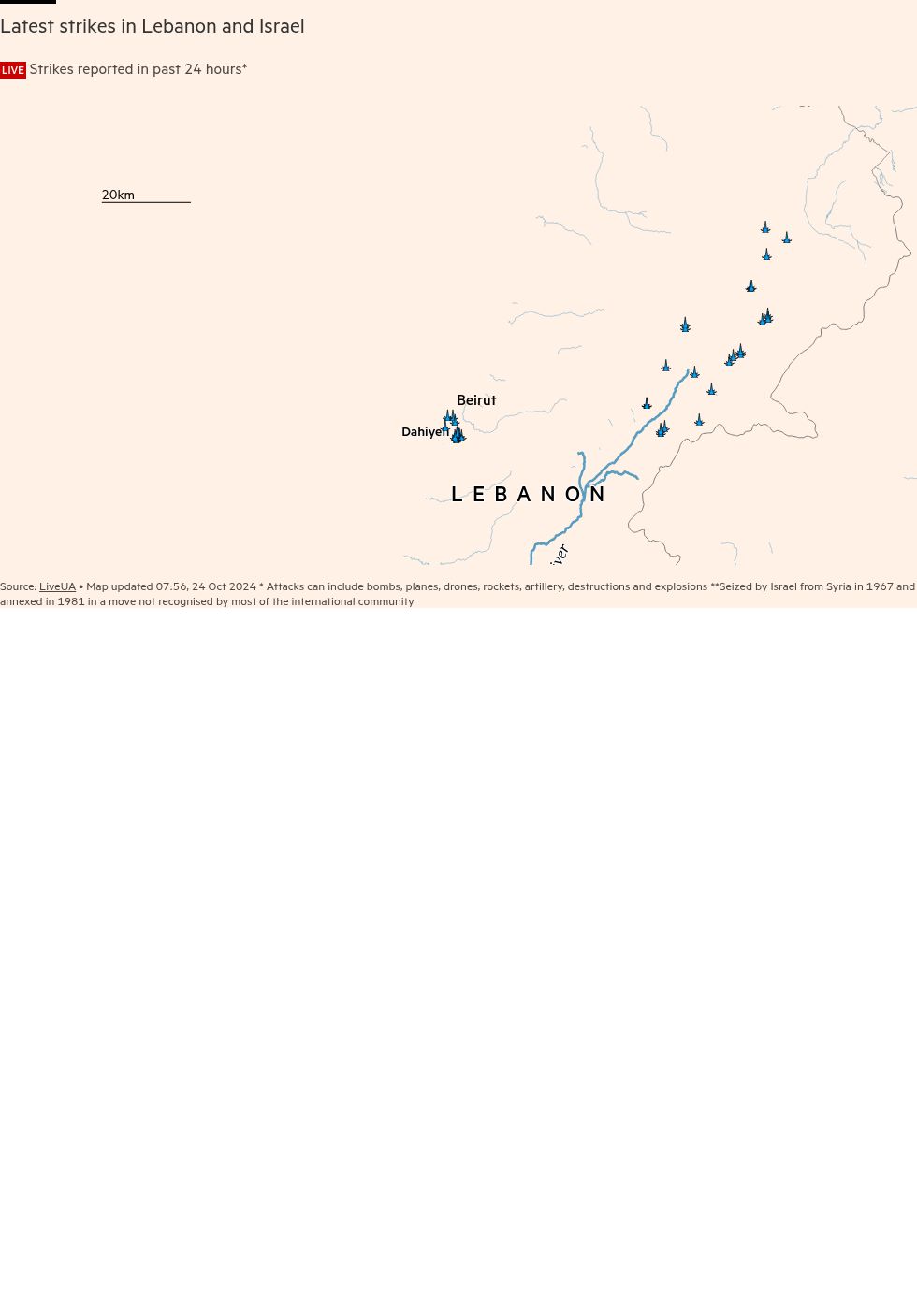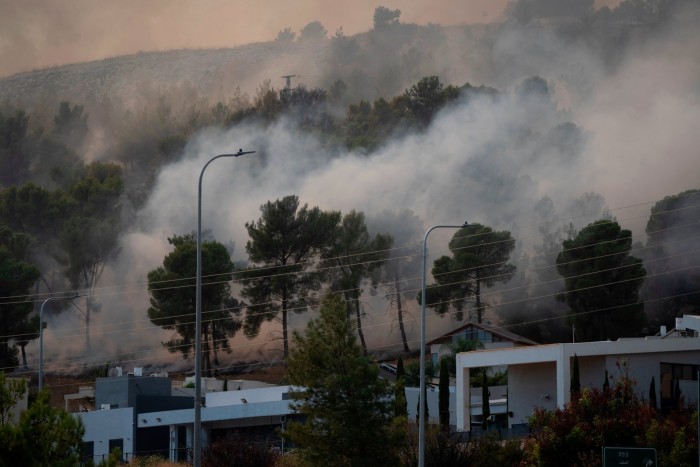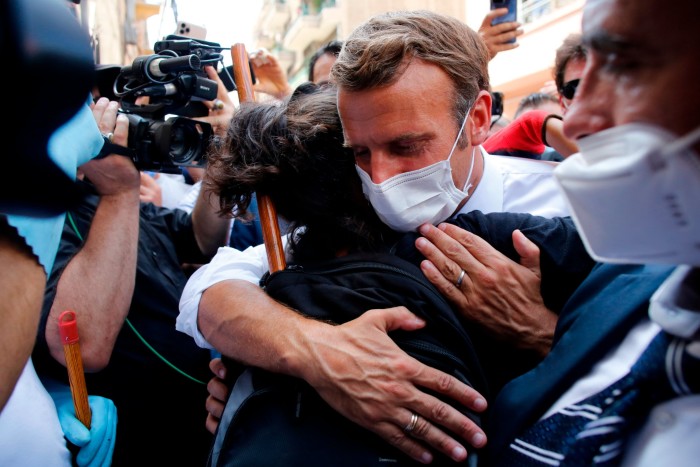
Emmanuel Macron is stepping up efforts to support Lebanon as he seeks to demonstrate France can be a relevant broker in the Middle East, and not just follow the lead of the US, the region’s most influential foreign power.
The president of France on Thursday will host dozens of senior foreign officials at a conference to rally humanitarian aid for Lebanon and to try to inject momentum into efforts to end the war as Israel steps up its offensive against Hizbollah.
“The sovereignty of Lebanon is a fundamental cause that France will always defend,” Macron said in Berlin last week after a meeting with US President Joe Biden and leaders of Germany and Britain. “It is essential to provide Lebanese institutions with the means to endure during this dangerous period.”
Macron and his predecessors have historically devoted diplomatic attention to Lebanon, France’s one-time protectorate, and the small country of about 5mn people remains a priority, even as French influence has waned from Africa to the Middle East.
French officials have recently warned Lebanon could slip into civil war. But the Israel-Hizbollah war has created a fresh opening for Paris to try to reassert sway in Lebanon. Macron is looking to leverage France’s historical ties with Beirut and use his ability to speak to Hizbollah and its patron Iran — something the US does not do directly.
French officials admit the chances of making progress on securing a ceasefire in Lebanon at the conference are slim, and privately acknowledge the US is the only power with significant leverage over Israel.
But they consider it is worth trying to cajole European and Arab allies to support their efforts on the diplomatic and humanitarian fronts.
“It’s important that we bring concrete answers to these problems [in Lebanon],” said an Elysée official. “That is why we want to advance rapidly to a ceasefire and then a political solution that involves all parties.”

The US and France have at times taken divergent views on how to respond to the escalating crisis in the Middle East, which was triggered by Hamas’s October 7 2023 attack on Israel.
While France joined other nations in saying Israel had a right to defend itself after the assault by Palestinian militant group Hamas killed 1,200 people and took 250 hostage, Macron was the first leader of a major western power to call for an immediate ceasefire last November as the casualties in Gaza mounted.
In September, France joined the US in pushing for a 21-day ceasefire between Hizbollah and Israel, but that effort failed after Israel assassinated the Lebanese militant group’s leader, Hassan Nasrallah, and expanded its campaign against the Iran-backed group.
Washington then said it supported Israel’s goals to degrade Hizbollah, while frustrated French officials continued to call for a ceasefire.
Many Lebanese have since come to view France as a more honest broker than the US, which they believe has given Israel the nod to increase its offensive against Hizbollah.
Since September, Israel’s offensive has killed more than 1,500 people in Lebanon and forced more than 1.2mn — about a quarter of the population — to flee their homes as Israeli bombing hit beyond Hizbollah strongholds.
Macron infuriated Israeli Prime Minister Benjamin Netanyahu days before the October 7 anniversary with a call “to stop delivering weapons to carry out the fighting in Gaza”.
Because France exports only small quantities of arms components to Israel, the comments were interpreted by some as a message to the US, which supports Israel with billions of dollars in arms.
Netanyahu responded by saying: “What a disgrace.”
The Israeli-Hizbollah conflict erupted after the Iran-backed force began firing at northern Israel shortly after Hamas’s October 7 2023 attack, in what it said was solidarity with the Palestinian militant group, forcing 60,000 Israelis to flee their homes.

Lebanon is an emotive issue in France because of the two countries’ shared history and the large Lebanese diaspora in the country.
But the issue is politically sensitive for Macron because Paris is also a traditional Israeli ally, as well as being home to the largest Jewish population in Europe, and the largest Muslim one.
Thursday’s conference aims to raise funds to at least cover the $420mn the UN requested earlier this month to stem the “humanitarian catastrophe” in Lebanon.
Macron also wants to secure support to bolster Lebanon’s army, which is not a party to the conflict but is deemed a critical, stabilising player in any resolution — despite being woefully under-resourced and dependent on international funding.
The US is expected to send a lower level delegation to Paris. Secretary of state Antony Blinken is on a tour of the Middle East.
Before the war erupted, Lebanon was mired in a deep political and economic crisis, and conditions have grown more acute since the Israeli attacks began.
The country faces shortages of basic goods to feed and house the more than 250,000 displaced people in government shelters, Lebanese officials said. Healthcare infrastructure is creaking, and more than 400,000 children are out of school.

This is not the first time Macron has thrown himself — mostly unsuccessfully — into the cause of helping Lebanon. He rushed to Beirut to a hero’s welcome in 2020 after a massive explosion at the city’s port, and promised aid for rebuilding while also calling out Lebanon’s dysfunctional political class.
Three aid conferences for Lebanon were convened. Emissaries were sent to canvas the various political factions, including Hizbollah, on political solutions, but the effort yielded few results.
Rym Momtaz, an analyst at Carnegie Endowment for International Peace, said Macron deserved credit for trying. France and European countries “have leverage in Lebanon that they do not have in Gaza” because they supply a large contingent of soldiers to the UN peacekeeping mission in the buffer zone between Lebanon and Israel, she added.
Emile Hokayem at the International Institute for Strategic Studies, said Macron also “recognises that no other western country would be ready to expend the kind of needed political capital, military resources, economic support to stabilise the country if it collapses totally”.
“So if France doesn’t get involved now to set the parameters of a resolution, it may have to do so later in worse conditions on its own,” Hokayem said. “For Macron but also France, Lebanon is too close to home.”